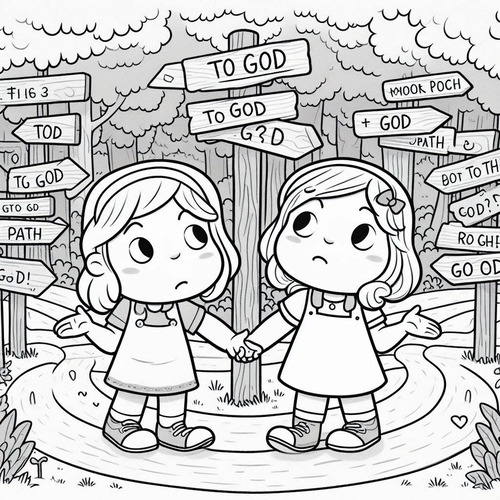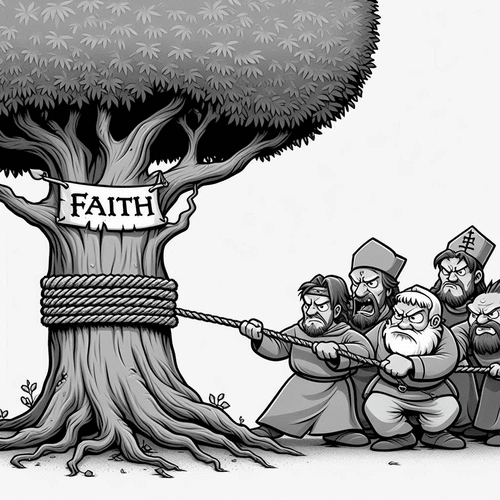Can Christians Affirm Both Creation and Evolution?
REFORMED PERSPECTIVES ON WHY WE ANSWER ‘NO’
In our scientifically-saturated culture, even sincere believers feel the pull to harmonise Scripture with Darwin’s theory. The desire to avoid perceived conflict between faith and science is understandable—even commendable.
But there’s a sobering truth: this attractive synthesis creates far more problems than it solves. When we attempt to merge biblical creation with evolutionary processes, we don’t simply add scientific insights to our theology—we systematically undermine foundational doctrines that have anchored Christian faith for centuries.
THE SEDUCTIVE BUT FLAWED SYNTHESIS
The compromise position—often called theistic evolution—appears elegant in its simplicity:
- God orchestrates evolution as His creative method. Rather than creating species directly, God guides natural processes over millions of years to produce the complexity we observe today. This preserves divine sovereignty while accepting mainstream scientific consensus.
- Adam represents humanity rather than being the literal first man. Instead of being the historical first human being, Adam symbolises everyman or serves as humanity’s federal representative without being chronologically first. This maintains theological concepts while accommodating evolutionary timelines.
- Death predates human sin. Millions of years of evolutionary struggle, predation, and extinction occurred before humanity arrived on the scene. Death thus becomes part of God’s original design rather than sin’s consequence.
- Core gospel truths remain intact. Proponents argue salvation, God’s love, and Christ’s work remain unchanged even if Genesis receives some re-interpretation. The “important” doctrines survive the scientific updating, or so the proponents claim.
THE BIBLE’S FRAMEWORK FOR TRUTH
Scripture claims to be our ultimate authority for faith and practice. This principle demands that we interpret difficult passages by clearer ones, not by external philosophical systems. Moreover, biblical theology recognises that Christian doctrines form an interconnected web where each truth depends on and supports others.
When cultural pressures challenge core Bible doctrines, we must examine whether proposed accommodations preserve the system’s integrity or introduce fatal contradictions. Church history shows theological compromises that often appear harmless initially, turn out to corrupt the entire doctrinal structure eventually.
CORE BIBLE DOCTRINES THAT BECOME CASUALTIES
When we examine what actually happens when creation meets evolutionary theory, we discover core Bible doctrines suffer devastating damage:
- The Bible’s inerrancy and authority suffer irreparable damage. Reinterpreting Genesis as allegory or poetry to accommodate evolution fundamentally erodes Scripture’s trustworthiness. If we cannot trust the Bible’s clear historical claims about origins, how can we trust its claims about salvation, judgement, or eternity? This approach effectively makes current scientific consensus the ultimate arbiter of Bible truth, completely inverting the principle that Scripture alone should govern our faith.
- The doctrine of redemption loses its foundation. Without a historical Fall, the entire gospel becomes incoherent. If death, suffering, and corruption were part of God’s original “very good” design rather than consequences of human rebellion, then what exactly did Christ come to redeem us from? The logic of salvation—that we need rescue from sin’s curse—collapses when sin never actually cursed creation.
- Doctrine of sin and the Fall collapses completely. If death predates Adam’s disobedience, Scripture’s explicit declaration becomes meaningless: “through one man sin entered the world, and death through sin” (Romans 5:12). Paul’s entire argument in Romans 5:12-21 depends on death being sin’s consequence, not God’s original design.
- Creation’s groaning loses all biblical meaning. Romans 8:19-22 describes creation’s suffering as temporary and unnatural—the result of humanity’s rebellion. If predation, disease, and extinction characterised God’s “very good” creation from the beginning, environmental degradation becomes natural rather than tragic consequence.
- The doctrine that we’re created in God’s image suffers fatal damage. Evolutionary theory describes gradual development from non-rational ancestors to rational humans. But when did humanity become image-bearers? Did God inject souls at some arbitrary evolutionary point? Scripture’s account of man’s special creation “in our image” (Genesis 1:27) provides no room for such speculation.
- Federal headship becomes incomprehensible. If we descended from pre-rational animals through natural processes, the biblical unity of soul and body that Scripture teaches becomes meaningless. Moreover, if Adam wasn’t actually first, he cannot represent all humanity in God’s covenant.
THE HERMENEUTICAL QUICKSAND
Theistic evolution forces selective literalism that ultimately undermines Scripture’s authority:
External scientific consensus becomes the interpretive grid. If current scientific paradigms determine which portions of Genesis we take literally, we’ve essentially made secular academia the final authority over God’s Word rather than allowing Scripture to interpret Scripture.
Dangerous precedent for biblical interpretation. This approach creates a slippery slope: whenever cultural pressure mounts against biblical teaching, we can simply reinterpret “difficult” passages as non-literal. Where does this end?
The Adam-Christ parallel crumbles. Paul’s crucial comparison in 1 Corinthians 15:45-47 depends on both figures being historical: “The first man Adam became a living being; the last Adam became a life-giving spirit.” If the first Adam becomes mythological, Christ’s redemptive work loses its covenantal foundation.
THE BIBLICAL ALTERNATIVE
Scripture offers a better way forward. Young Earth Creationism maintains the most consistent hermeneutic, though other approaches like the Framework or Day-Age interpretations preserve essential doctrinal connections while allowing some interpretive flexibility. The key is maintaining Scripture’s historical reliability and the interconnected nature of Bible doctrine.
We need not fear genuine scientific discovery, but we must distinguish between observable facts and theoretical interpretations built on naturalistic assumptions that explicitly exclude divine action.
WHY BIBLICAL INTEGRITY MATTERS
The temptation to accommodate evolutionary theory feels intellectually humble, but biblical analysis reveals it as actually presumptuous—presuming to correct Scripture by current scientific consensus. True intellectual humility trusts God’s revealed Word, properly interpreted, provides the reliable foundation to help us understand both spiritual and physical reality.
When we compromise foundational Bible doctrines for cultural respectability, we don’t strengthen Christian faith—we systematically hollow it out. Scripture calls us to a higher standard: coherent, Bible-based theology where each doctrine supports and strengthens the others, creating an unshakeable foundation for Christian life and witness.
CAN CHRISTIANS AFFIRM CREATION AND EVOLUTION? RELATED FAQs
How does Young Earth Creationism maintain a consistent hermeneutic? Young Earth Creationism applies the same interpretive principles to Genesis that it uses throughout Scripture—taking the text at face value unless clear literary markers indicate otherwise. It treats the genealogies, chronological markers, and narrative style in Genesis 1-11 the same way it treats similar elements in the rest of biblical history. This approach avoids the arbitrary distinction between “mythological” early Genesis and “historical” later books, maintaining that Scripture interprets Scripture.
- What are the Framework and Day-Age interpretations, and how do they differ from evolutionary creation? The Framework interpretation sees Genesis 1 as a literary structure emphasising God’s ordered creative work rather than strict chronology, while Day-Age theory interprets the “days” as long periods of time. Both maintain God directly created different kinds of life and that Adam was a historical individual whose fall brought death into the world. Unlike evolutionary creation, these views preserve the essential doctrinal connections—particularly that death resulted from sin rather than being part of God’s original design. They offer interpretive flexibility while maintaining biblical authority and the historical nature of the Fall.
- What does the Westminster Confession teach about creation that impacts this debate? The Westminster Confession (IV.1) declares God created all things “in the space of six days, and all very good,” emphasising both timeframe and the perfection of original creation. It explicitly states that our first parents were created in “knowledge, righteousness, and true holiness” (IV.2) and that their fall brought “death and all miseries spiritual, temporal, and eternal” (VI.2). This confessional language directly contradicts evolutionary timescales and the idea that death predated human sin, showing that historic Reformed theology viewed these issues as settled biblical doctrine.
How do the Belgic Confession and Heidelberg Catechism address human origins and the Fall? The Belgic Confession (Article 14) teaches that God “created man of dust from the ground and breathed into his nostrils the breath of life,” emphasising humanity’s special creation rather than evolutionary development. The Heidelberg Catechism (Q&A 7-8) explicitly connects human misery to Adam’s disobedience in paradise and states that we are “conceived and born in sin” because of our fallen nature inherited from Adam. Both confessions assume Adam’s historical reality and federal headship, making evolutionary accounts of human origins incompatible with these foundational Reformed documents.
- Doesn’t accepting an old earth show intellectual honesty about scientific evidence? Accepting geological timescales isn’t necessarily the issue—the critical question is whether death entered through Adam’s sin or existed for millions of years before humanity. Some faithful interpreters accept an old earth while maintaining that God directly created life and that the Fall introduced death and corruption. The key distinction is between acknowledging evidence for earth’s age versus accepting naturalistic explanations for life’s origin and development that eliminate God’s direct creative acts and make death natural rather than sin’s consequence.
- How do we respond to Christians who say Genesis was never meant to be read as literal history? While Genesis contains rich theological truth, the text itself provides strong indicators of historical intent—genealogies connecting Adam to Abraham, chronological markers, and narrative style consistent with historical books. Jesus and the apostles referenced Genesis events as historical reality (Matthew 19:4-6, Romans 5:12-21), never suggesting allegorical interpretation. Most importantly, if we can’t trust Scripture’s claims about the past, why should we trust its claims about the future? The same hermeneutical scepticism that makes Genesis mythical can ultimately make the resurrection questionable.
What about Christians who work in scientific fields—are they forced to choose between faith and career? Faithful Christians can and do work successfully in scientific fields while maintaining biblical convictions about origins. The key is distinguishing between operational science (which studies present processes and is highly reliable) and historical science (which makes inferences about unobserved past events). Many geological, biological, and astronomical observations are compatible with biblical creation when we recognize that current naturalistic interpretations aren’t the only possible explanations for the data. Scientists can excel in their fields while maintaining that God’s revealed Word provides the authoritative framework for understanding ultimate origins.
CAN CHRISTIANS AFFIRM CREATION AND EVOLUTION? OUR RELATED POSTS
Editor's Pick

Why Do People Hate the Doctrine of Election?
…WHEN THEY REALLY SHOULDN’T Few Bible doctrines provoke stronger reactions than election. The idea that God chose some for salvation [...]

The Doctrine of Providence: Does God Really Govern All Things?
You’re sitting in the doctor’s office when the diagnosis lands like a thunderclap. Your mind races: Why this? Why now? [...]

No Decay, No Defeat: What It Means That Christ’s Body Saw No Corruption
On the Day of Pentecost, Peter stood before thousands and made a startling claim: David's body decayed in the tomb, [...]
SUPPORT US:
Feel the Holy Spirit's gentle nudge to partner with us?
Donate Online:
Account Name: TRUTHS TO DIE FOR FOUNDATION
Account Number: 10243565459
Bank IFSC: IDFB0043391
Bank Name: IDFC FIRST BANK






